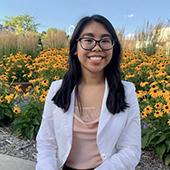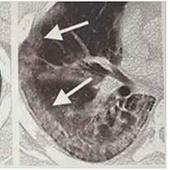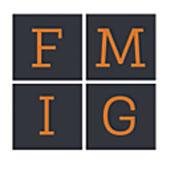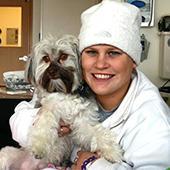- Board of Regents October meeting highlights.
- Features: Engineering to save lives; ‘The audacity to do something.’
- People: The Department of Laboratory Medicine and Pathology has been selected as one of four Capacity Building Centers in the country; and more.
Board of Regents October meeting highlights
At its October meeting, the U of M Board of Regents voted in favor of a revised proposal from Gopher Athletics—one that will discontinue the Gopher men’s gymnastics, men’s tennis, and men’s indoor track and field programs. Gopher men’s outdoor track and field was not included in this revised plan. The Board also approved a proposal to fund a COVID-19 saliva testing program for University students systemwide, approved President Gabel’s recommended FY22-23 biennial budget request, and approved Gabel’s recommended six-year capital plan and 2021 state capital request. See more details in the news release.
Engineering to save lives
Kate Fernandez wanted to go to medical school for as long as she could remember. She wanted to use her interest in science and technology to help people, and becoming a doctor seemed like the most logical path—until her mother encouraged her to look into engineering. “Through that, I got to see, ‘Oh, I can help people, but I don’t have to be a doctor,’” says Fernandez, a senior studying electrical engineering. “I can utilize engineering to help people, and that called to me more than directly treating patients.” Learn more about her educational path.
‘The audacity to do something’
It was Dec. 29, 2019, and Jakub Tolar was alarmed. “Where is all the black?” he thought. Tolar, dean of the U of M Medical School and vice president for clinical affairs, was examining a CT scan from one of the earliest known COVID-19 cases in Asia. The patient’s lungs had been overtaken by SARS-CoV-2. “Black means you have air in your lungs,” Tolar says. “There was very little black on this scan.” That’s when he realized COVID-19 was unlike anything he’d seen before, and that the University would need an all-hands-on-deck effort to respond. Here are just a few examples of experts at the U of M who turned their attention to the challenge.
People
The Department of Laboratory Medicine and Pathology has been selected as one of four Capacity Building Centers in the country; a new $2.4 million NIH grant will aid Medical School researchers in identifying better ways to treat acute intoxication by fentanyl and fentanyl-like drugs; Carol Lange will use a new grant by METAvivor to analyze the biological mechanisms behind breast cancer; the School of Nursing has received the Health Professions Higher Education Excellence in Diversity Award from INSIGHT Into Diversity Magazine; U in the News features highlights of U faculty and staff cited in the media. People
Retirement Incentive Option enrollment ends Oct. 19
The last day to enroll in the Retirement Incentive Option is Oct. 19. Interested faculty, P&A, civil service, and labor-represented employees must complete an application and meet the program requirements before that date and retire by Jan. 15. Visit z.umn.edu/UMNRIO for details, eligibility requirements, frequently asked questions, and a video webinar. The Office of Human Resources can answer additional questions at [email protected], 612-624-8647, or 800-756-2363.
Equity and Diversity Breakfast postponed
The Office for Equity and Diversity (OED) will not be holding an in-person Equity and Diversity Breakfast this year due to COVID-19. OED will be announcing plans soon for a virtual event in the spring that will honor the work of students, faculty, and staff to advance equity, diversity, and inclusion across the University of Minnesota System. More information will be posted on the OED website as it becomes available.
Applications open: U of M Water Council
The Water Council is inviting applications for seven additional members to begin a three-year term starting Jan. 2021. The Water Council was founded by the Office of the Vice President for Research and serves to bring together resources from across the University of Minnesota System to address the pressing concern of access to clean water. Applications are due Nov. 1.
U of M opens first-of-its-kind clinical trial to treat metastatic GI cancers using CRISPR genetic engineering
The University of Minnesota has opened a new and innovative clinical trial for the treatment of metastatic gastrointestinal solid tumor cancer. The Phase II clinical trial, which will use cutting-edge CRISPR genetic engineering, has opened exclusively at the M Health Fairview University of Minnesota Medical Center, and has already begun enrolling patients.
Tracing embedded water in meat and ethanol supply chains
Water is embedded in everything we eat. There’s water inside a banana, a leaf of lettuce, an ear of corn—but the most water, by far, is in meat. So swearing off meat should be a great way to lower your water footprint, right? Well … not exactly. New research from the U of M and the University of New Mexico analyzed the embedded irrigation water in U.S. chicken, pork, beef, and ethanol by tracing the water through the supply chain.
Research Brief: Researchers 3D print unique micro-scale fluid channels used for medical testing
In a groundbreaking new study, researchers at the University of Minnesota, in collaboration with the U.S. Army Combat Capabilities Development Command Soldier Center, have 3D printed unique fluid channels at the micron scale that could automate production of diagnostics, sensors, and assays used for a variety of medical tests and other applications. Additional recent Research Briefs include “Crowdfunding campaigns seeking donations supporting the use of investigational medical products provided via expanded access or ‘right-to-try’ pathways.”
U of M featured virtual events
Oct. 14 - In the Field: Conversations with Creatives
Oct. 16 - Feminist Friday: Indigenous Feminist Futurism ft. Sammie Ardito Rivera
Oct. 16 - Reconciling COVID Research and Treatment
Oct. 16 - Environmental Justice, Pandemics, and Health Inequities
Oct. 21 - Probable Meets Possible: When Life Gets Weird
Oct. 21 - Professor David Schultz and the 2020 Presidential Elections
Oct. 21 - Behind the headlines: Reporters and news consumers in a 24/7 media world
Oct. 21 - Design in a Post-Pandemic World: Homelessness
Oct. 22 - Petri Dish - Better With Age?
Oct. 23-24 - Just Code: Power, Inequality, and the Global Political Economy of IT
Supply chain series video: Dairy
Individual demand for dairy spiked as people rushed grocery stores in the early days of the pandemic, while demand at schools and restaurants fell dramatically. This imbalance led to hikes in prices for milk and shortages throughout the country. In this video, dairy producers and processors explain how they weathered the pandemic and innovated through challenges.
NRRI awarded EPA grant
The Natural Resources Research Institute (NRRI) has received a $3 million grant from the U.S. Environmental Protection Agency for the Great Lakes Sediment Surveillance Program. NRRI will collect sediment samples throughout the entire Great Lakes system, including Canadian waters, in order to analyze over 250 different contaminants. NRRI researchers want to better understand the interactions between these contaminants and the environment.
COVID-19 and mind-body trauma
Assistant Professor Viann Nguyen-Feng, psychology, is looking to understand the connection between mind-body trauma and COVID-19. As director of UMD’s Mind-Body Trauma Care Lab, her research focuses on the intersection of mental and physical health as well as mind-body integration, particularly in the context of trauma care. Nguyen-Feng also serves as a core faculty member in the counseling/clinical psychology master's program.
Medical School, Duluth Campus student group earns national award
The Family Medicine Interest Group, a student group at the University of Minnesota Medical School, Duluth Campus, was recognized by the American Academy of Family Physicians as the 2020 Program of Excellence for exemplary efforts to grow and support interest in family medicine practice. Raymond Christensen, associate professor in the Department of Family Medicine and Biobehavioral Health, is the group’s faculty advisor.
U of M Morris and Ever-Green Energy release campus carbon neutrality plan
In the year since Ever-Green Energy chose U of M Morris for the Roadmap to Carbon Neutrality Program, the two organizations have worked together to develop sustainable energy pathways for the campus to pursue. These pathways will help guide U of M Morris in its plan to achieve full carbon neutrality. A new report outlines the journey to get there.
U of M Morris @HOMEcoming 2020: Campus stories
In celebration of U of M Morris’s 60th year, alumni and friends took part in an online conversation about the early vision for the campus and how that vision speaks to us today. Watch Associate Professor Stephen Gross, Professor Emeritus Jim Togeas, the Honorable Keith Davison, Professor Emeritus Jim Olson, and Mary Klauda ’77 share their Campus Stories: Reflections on the Early Years.
Disruptions and innovation: Higher Ed’s Big Rethink webinar series
Innovative educators across the country are paying close attention to what COVID-19 adaptations can teach us about future states. Hear forward-looking interviews via Higher Education’s Big Rethink webinar series. Representing the innovative Rochester campus, Chancellor Lori Carrell’s interview suggests that investigating the interlocking puzzle pieces of quality, equity, and cost will require collective intentionality, new partnerships, amplified engagement in public rhetoric, and evidence-informed pedagogical and curricular change.
‘Community Read’ dialogue series
U of M Rochester’s commitment to all students remains a top priority for this campus community devoted to equity in educational attainment. To further collective professional development and connection in this semester of separation, faculty and staff are participating in the first UMR Community Read. Facilitated dialogues on Ibram X. Kendi’s award-winning 2019 book, How to be an Antiracist, are taking place in partnership with the Rochester Diversity Council.
How racism affects your health
“Can’t you just work on something else?” It’s a question that Brooke Cunningham has fielded repeatedly. An assistant professor in the U of M Medical School’s Department of Family Medicine and Community Health, Cunningham studies racial inequities in health and health care systems, provider bias, and how we can make meaningful change.
Groundbreaking clinical trial turns tide after rare cancer diagnosis
Sarah Ewald fought alveolar rhabdomyosarcoma twice. Now, seven years after a clinical trial put her second cancer in remission, she is 28 years old, married to her high-school sweetheart, and a 2016 University of Minnesota graduate. She uses her marketing degree in her work at her family’s association management company.
Oct. 22 - Join in a virtual journey to the new Health Sciences Education Center
Experience the next generation of health sciences education at this conversation and behind-the-scenes look at how the U of M’s new, state-of-the-art interdisciplinary Health Sciences Education Center (HSEC) is transforming education for students in medicine, dentistry, public health, pharmacy, and nursing. The program will feature Jakub Tolar, vice president for clinical affairs, and Rachel Croson, executive vice president and provost, as well as other leaders describing the unique and innovative functions inside the building. 1-1:45 p.m.
Nov. 5 - Headliners - For the Ages: Election 2020
Hosted by Lifelong Learning in the College of Continuing and Professional Studies, join in this post-election event (registration required) with political scientist Kathryn Pearson. Pearson will help us gather our collective senses and better understand where we’ve been, where we’re headed, and the election’s implications for governing in the years to come. 7-8:30 p.m., online via Zoom.








